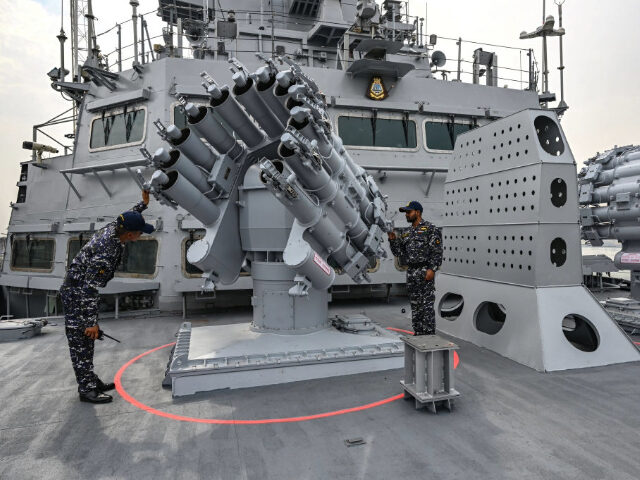Indian Navy Chief of Staff Adm. R Hari Kumar said on Wednesday that India is beefing up its Arabian Sea naval presence to intimidate pirates out of preying on commercial shipping.
At least a dozen Indian warships loaded with marine commandos, helicopters, and drones will soon patrol those dangerous waters.
Kumar said intimidating displays of force have already been effective at reducing piracy.
“Recently, we have had only two incidents,” he said. “Both were not Indian flagged vessels, but in the second case, we had Indian crew, so we had to respond. So we boarded and rescued the crew.”
“So we are now very proactively deploying our units there to ensure that these pirates keep away,” he said.
Kumar noted that India has been conducting anti-piracy operations in the region since 2008, so the new warship deployments represent an increase in tempo rather than an entirely new mission for the Indian Navy.
Kumar made his remarks during a press event at Adani Aerospace Park in Hyderabad to debut India’s new Drishti 10 Starliner drone, a product of India’s Adani Defense and Aerospace company, with assistance from Israel’s Elbit Systems.
The Drishti 10 is India’s most advanced domestically produced drone, able to remain airborne for 36 hours in all weather conditions while carrying almost a thousand pounds of ordnance, plus sophisticated Intelligence, Surveillance, and Reconnaissance (ISR) equipment.
Adm. Kumar said India stepped up development and production of unmanned aerial vehicles (UAVs) because India’s “immediate neighbors” have developed extensive drone inventories and because threats to shipping increasingly involve terrorist drones. He said the Indian military is still analyzing the debris from three drones that attacked ships in the Arabian Sea to determine their origins and capabilities.
Kumar said autonomous weapons have become a “preferred choice in the order of battle” for both nations and non-state actors, and India wanted to demonstrate its commitment to the spirit of atmanirbhar, or self-reliance, by producing its own top-shelf UAVs.
Both Kumar and Defense Minister Ajay Bhatt said at the Hyderabad event that the new Drishti 10 drone would become a keystone of India’s naval operations, including anti-piracy patrols. Bhatt additionally praised the performance of India’s marine commandos (MARCOs) in rescuing hijacked ships.
Senior Indian officials said on Wednesday that India’s deployment of ten warships to the Arabian Sea would soon be increased to 12, all of them carrying MARCOs and U.S.-made MQ-9 drones, which India currently relies on for naval operations. India had only two warships stationed in the Arabian Sea in 2023.
India still refuses to join the U.S.-led Operation Prosperity Guardian to protect shipping from attacks by the Iran-backed Houthis terrorists of Yemen.
Bloomberg News on Wednesday attributed this continuing reluctance to India’s “deep historical ties” with the Houthis’ patrons in Iran, India’s general reluctance to join international coalitions unless they have the imprimatur of the United Nations, and India’s desire to be seen as the “primary security partner for nations in the region.”
“In addition, New Delhi reasons since the U.S.-led coalition is operating in the Red Sea, strengthening anti-piracy operations in the Arabian Sea would only add to the overall effort to secure commerce in the region,” Bloomberg said, quoting unnamed senior Indian officials.

COMMENTS
Please let us know if you're having issues with commenting.